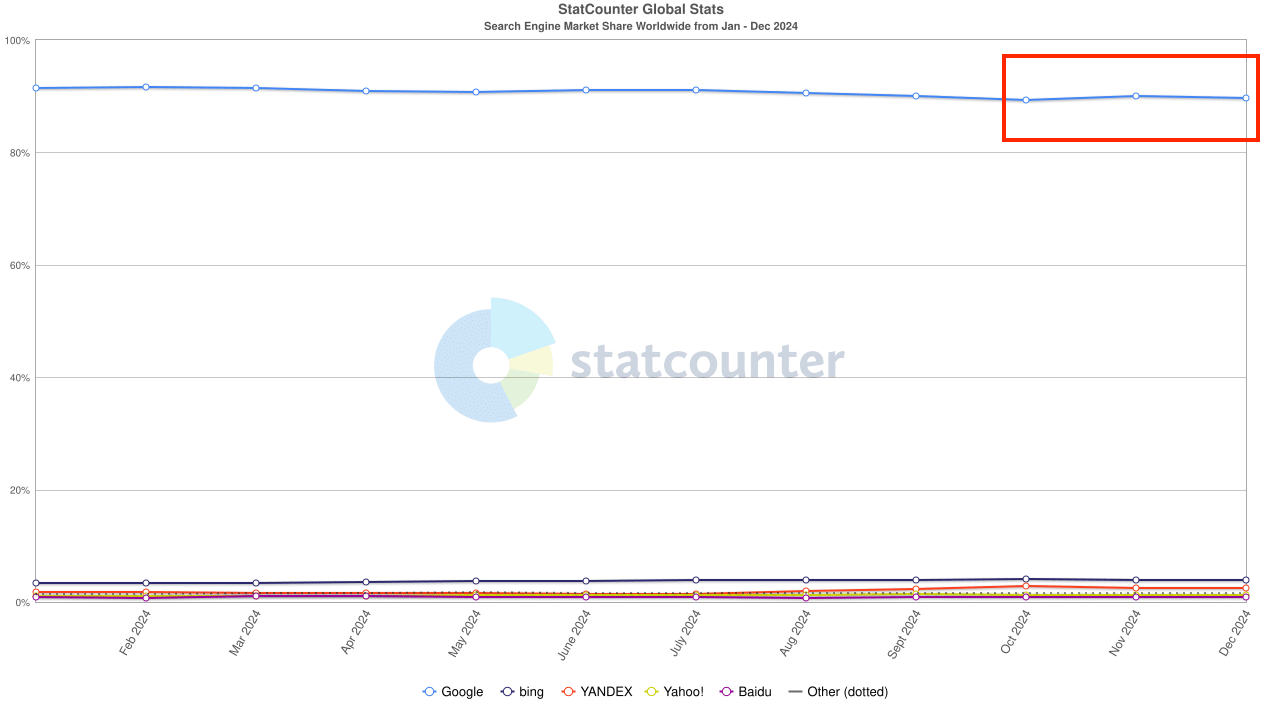In 2000, Google surpassed Yahoo! to become the world’s largest search engine — only two short years after it first launched in 1998. Since then, Google remained dominant by adding new products and services that created an entire digital ecosystem for individual users and businesses. In early 2024, Google reached record usage with over 6.3 million searches per minute (equivalent to 8.5 billion searches per day around the world). According to Statcounter, things took a surprising turn in Q4 of 2024 when Google’s global search market share dropped below 90% for the first time since 2015.

via Statcounter
Google has been around long enough to experience the ever-changing digital landscape; new platforms have come and gone countless times since Google was founded. This leads marketing experts to the same question: how did Google go from record-breaking numbers to its lowest market share in almost 10 years?
Change In Search Behavior
Traditional search engine usage is quickly declining. Forecasts are predicting traditional search engine volume will drop up to 25% by 2026. The late 2000s through the 2010s saw a technological revolution that changed the devices we adapted into our daily lives. We rapidly transformed from clunky desktop computers to smartphones, tablets, smart TVs, wearable technology and more — changing when we use the internet and search engines. So far, the 2020s have been all about improving those devices by optimizing performance, applications and the overall user experience — changing how we use the internet and search engines. The change in search behavior in 2024 stems from a few different key factors:
Emerging AI: AI assistant tools like ChatGPT are growing in numbers, drawing in over 100 million weekly users in late 2024. These platforms are favored for their ability to draw from a variety of sources without results being influenced by advertising dollars.
Change in Social Media Behavior: Social media started as an online platform to connect with your personal friends and family. In 2022, Meta updated their feed organization from chronological content created by your mutual connections to a more behavioral algorithm that showcases content from a variety of sources based on your previous activity. This major algorithm update changed how social media is being used — turning it into a powerful research platform to discover new brands, products and creators based on your personal activity on the app. In fact, 46% of Gen Z and 35% of Millennials now prefer social media over traditional search engines because results are more personalized to their needs and interests.
Video vs Written Content: Social media and video platforms are visual media-heavy compared to text-heavy search results pages from Google. Across multiple generations, video has become the preferred way to receive information. Studies show viewers retain 95% of a video’s message compared to 10% when reading text. User-generated video content is more attention-grabbing and feels more trustworthy than written branded content. This led to a shift in search behavior to favor user-generated video over text, as well as the platforms used to discover the video content they are looking for.
Google’s Public Image: 2024 was a tough year for Google in more ways than one. With the internet becoming more accessible over time, it’s harder for brands to hide any negative press. In October 2024, Google underwent an antitrust lawsuit with the United States Department of Justice which ultimately led to a ruling that Google is a monopoly that must be lawfully broken down into parts. Today’s average internet user is more tech-savvy and aware of their digital footprint. They will favor platforms they feel safest, and a lawsuit from the federal government is bound to have an impact on how safe they feel using Google.
The TikTok Ban Effect
If internet users are favoring video content on social media platforms, what will happen to search behavior after the looming TikTok ban takes place? The first thing that will change is the next platform users will flock to. It’s too early to tell exactly which one will come out dominant; however, the favorites are YouTube and Instagram since these two platforms have adapted many new features that mimic the experience of TikTok already. High-quality user-generated video content will stay the preferred media users want to consume. However, what will likely change is how users engage with videos, including how long they will watch videos and how they share content with friends. This will impact how video marketing is measured and analyzed in terms of success.
What This Means For Your Business
If you’re wondering how to market your business in 2025, the best solution is to build a multi-channel digital marketing strategy that is designed for the target demographic and search behavior trends of each platform. The digital marketing landscape is always evolving so it’s important not to put all your eggs in one basket. To build an effective digital marketing strategy, you must align your marketing plan with your target audience and produce high-quality content that is relevant to what they are searching for. Users don’t stick to a single platform throughout their buyer journey. Not every social media follower or Google searcher will become a paying customer on your website. Each platform will find its place in your sales funnel, and those platforms will change over time. TikTok might get banned and Google might lose monthly searchers, but the need for high-quality content remains the key to successful marketing. What matters more than the platform is a consistent high-quality content strategy that is relevant to your audience on each platform with specific call-to-actions that guide your audience through your defined sales funnel.
Ready to elevate your video and search advertising? At Katava Marketing, your vision is our mission! Our full-service marketing agency offers video marketing, search engine marketing, website development and everything else your business needs to increase its revenue. Contact us to get started today!





